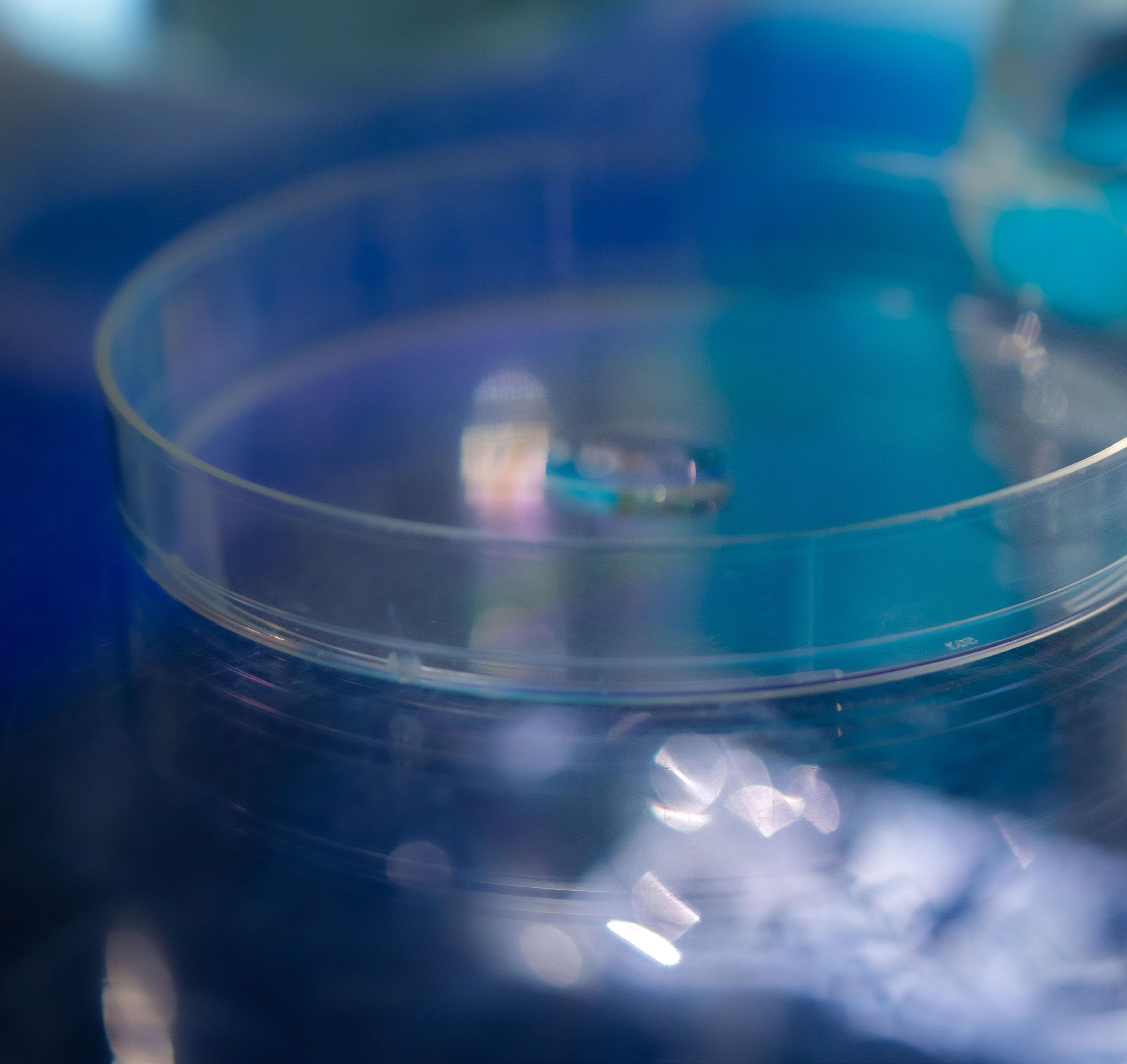
4 minute read
Maine Innovation Economy Action Plan
How science and technology can drive economic growth and benefit all Maine people
Every day, thousands of Maine people go to work at businesses that compete in the global economy by leveraging innovations developed by Maine researchers. From farmers and food processors to lab technicians and those transforming Maine’s forests into a nanocellulose powerhouse, businesses are turning the work of our public, private, and nonprofit research institutions into tangible economic opportunities. They employ the full spectrum of workers, from cleaners and delivery drivers, to salespeople, project managers, and executives, and their payrolls indirectly support even more businesses and workers. They are innovating, growing, and successfully competing in today’s global economy.
As Maine seeks to build a resilient 21st-century economy, these businesses are pointing the way. And yet, the potential of research and development (R&D) to build prosperity has not been fully realized. Historically, Maine’s R&D investments have been low — just 1% of GDP compared to the national average of almost 3%. In 2021, Maine ranked 44th of the 50 states by this measure. Maine voters and businesses have continually supported meaningful contributions of both public and private dollars, but not enough to create transformative, statewide growth.
In this 2023–2027 plan, the Maine Innovation Economy Advisory Board (MIEAB) presents a vision for science and technology as drivers of economic opportunity across the state. It acknowledges the significant investments made to date and affirms the potential to realize even greater gains by replicating the proven success of partnerships among Maine researchers and innovators.
Vision: A resilient, innovation-driven economy that creates opportunities for all Maine people
Realizing this vision will require the commitment and coordination of researchers, educators, policymakers, and business leaders; a rigorous focus on R&D that yields tangible opportunities for Maine businesses; attention to workforce development; and a transformative funding increase. This is possible through the pursuit of five complementary goals:
Goal 1: Increase R&D to 3% of GDP while focusing on activities that directly support Maine industries
This long-term goal calls for a transformational increase in the amount of R&D occurring at Maine’s public, private, and nonprofit institutions. Priority should be placed on work that yields direct economic opportunities for businesses and communities across Maine.
Goal 3: Prepare an innovation workforce
Maine residents must have the skills to innovate across a broad range of industries, within companies large and small, and to access high-quality employment opportunities. And Maine businesses need talent to innovate and grow.
Goal 4: Help businesses and communities thrive in the face of climate change
In the coming years, Maine industries and communities will face critical, even existential, challenges due to climate change. Maine’s R&D community must be a ready source of knowledge and innovation to help them adapt and thrive.
Goal 5: Strengthen Maine’s R&D ecosystem
Goal 2: Strengthen pathways to
Successful Commercialization
Turning the research accomplishments of Goal 1 into commercial success requires cultivating entrepreneurship and innovation within enterprises.
Lastly, Maine must continue improving its framework for R&D investments and activities, ensuring coordination, collaboration, efficiency, and maximum benefits for all involved. It also must raise public awareness of R&D’s role in economic development. For
Advancing Maine’s targeted technology sectors
This plan supports and advances the targeted technology sectors that have guided Maine’s R&D investments since 1999. The “heritage industries” correspond directly to individual target sectors. The “high-growth target sectors” combine elements of multiple sectors in new and creative ways, generating new opportunities across multiple industries.
Heritage Industries
AGRICULTURE
AQUACULTURE & MARINE SCIENCES
High-Growth Target Sectors
FORESTRY & FOREST PRODUCTS
AEROSPACE
ARTIFICIAL INTELLIGENCE
BIOBASED ALTERNATIVES
Advanced Building Products
Algae & Algal Products
Biochemicals
Biomanufacturing
About this plan
State law directs the Maine Innovation Economy Advisory Board (MIEAB) to create a plan every five years to improve Maine’s standing in the global economy. This 2023 plan is the culmination of almost 18 months of input from representatives of Maine’s public, private, and nonprofit institutions and private businesses. The board used stakeholder recommendations to craft this plan and incorporated stakeholder feedback on multiple drafts prior to adopting the final document. The final plan was approved by MIEAB on March 22, 2023.
Maine Innovation Economy Advisory Board
Scott Bloomberg, University of Maine School of Law; Deborah Bronk, Bigelow Laboratory for Ocean Sciences; Denise Bruesewitz, Colby College; Emily Christy, Tiny Barrel Ventures; Barry Antonio Costa-Pierce, Ecological Aquaculture Foundation and Nord University, Norway; Patrick Cunningham, Blue Marble Geographics; Christopher Davis, Maine Aquaculture Innovation Center; Kate Dickerson, Maine Discovery Museum; Habib Dagher, University of Maine Advanced Structures and Composites Center; Michael Duguay, Thomas College; John Ferland, Ocean Renewable Power Company; Joan Ferrini-Mundy (Chair), University of Maine, University of Maine at Machias, University of Maine System; Patricia Hand, MDI Biological Laboratory; Karen Houseknecht, University of New England; Amber Lambke, Maine
HUMAN HEALTH
Biomedicine & Engr. Advances
Healthy Aging
RENEWABLE ENERGY
Offshore Wind Energy
Tidal Energy
Many thanks to reviewers and contributors from the following organizations: Bigelow Laboratory for Ocean Sciences, Blue Lobster Consulting, Blue Marble Geographics, Colby College, Downeast Institute, Ecological Aquaculture Foundation, Governor’s Energy Office, Governor’s Office of Policy Innovation and the Future, LandVest, Maine Forest Service, Maine Department of Economic and Community Development, Maine Discovery Museum, Maine Governor’s Energy Office, Maine Grains, Maine Marine Composites, Maine Technology Institute, Maine Venture Fund, MaineHealth, Mount Desert Island Biological Laboratory, Mook Sea Farms, National Renewable Energy Laboratory, Nord University (Norway), Ocean Renewable Power Company, Pavan Enterprises, Roux Institute at Northeastern University, Stonyfield Farm, The Nature Conservancy, United States Department of Agriculture (Agricultural Research Service and Forest Service), University of Maine, University of Maine School of Law, University of New England, University of Southern Maine
Grains; Emily Lane, Blue Lobster Consulting; John M. Pavan, Pavan Enterprises, LLC; Joe Powers, Maine Venture Fund; Kris Sahonchik, University of Southern Maine and Catherine Cutler Institute, Topaz Smith, ENNOBLE; Dianne Tilton, Downeast Institute; Stephen Von Vogt, Maine Marine Composites; Brian Whitney, Maine Technology Institute Supporting (non-voting) individuals: Kate DeLutio, MaineAppliedResearch, Shane Moeykens, Maine EPSCoR, and Jason Charland, University of Maine.


